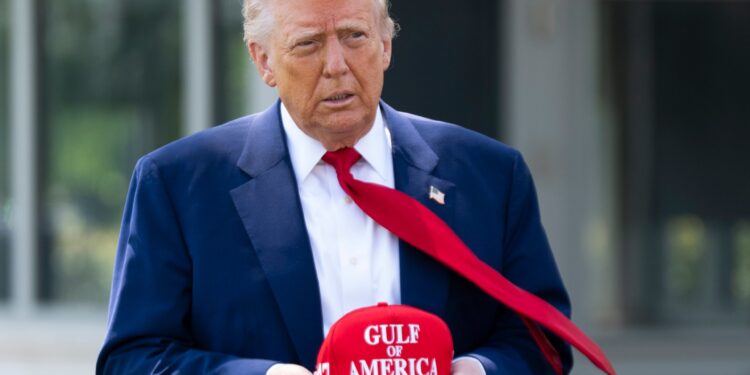On Tuesday, US President Donald Trump signed two things to alleviate customs duties on cars, through a mixture of credit credits and exemptions from other fees on the materials, while his commercial team promoted his first deal with a foreign commercial partner.
The developments helped to alleviate some investors’ concerns about Trump’s irregular commercial policies, who visited Michigan -the cradle of the auto industry in the United States -just days before the imposition of a new set of fees by 25% on the components of cars.
The journey comes, on the eve of 100 days since he takes office, while Americans are increasingly adopting a bleak view on the Trump administration of the economy, amid indications that customs duties will affect growth and may lead to high inflation and unemployment.
In his latest partial retreat from the customs definition policies, the Republican President agreed to grant car manufacturers two years to enhance the percentage of local components in vehicles that are collected locally.
The automotive leaders exerted great pressure on the US administration during the weeks that followed Trump’s announcement of customs duties by 25% on vehicles and imported spare parts.
These drawings – which aim to force car manufacturers to re -manufacture to the United States – threatened to disable the car production network in North America across the United States, Canada and Mexico.
Trump said, while leaving Washington, heading to Michigan that this decision reduces the burden on industry, as companies invest in more American production.
“We only wanted to help them … If they could not get spare parts, we do not want to punish them,” he added.
With this decision, manufacturers will be exempt from paying other customs duties, such as those imposed on steel or aluminum.
The White House said this change will not affect the 25% customs duties that were imposed last month on 8 million cars imported by the United States annually.
The Wall Street Journal reported that the executive order includes changes in the mechanism of application of import fees, in order to prevent the imposition of multiple customs definitions on the vehicles manufactured abroad, and to reduce customs tariffs on imported spare parts for car manufacturing locally.
The newspaper said these changes will be applied retroactively.
welcome
The “Outus Drive America” group, which represents Toyota, Volkswagen, Hyundai and 9 other foreign auto manufacturing companies, announced that Trump’s decision reduced some restrictions, “but it is necessary to make more efforts to enhance the American auto industry.”
Candice Liang, head of the Canadian Chamber of Commerce, said that the repair of customs duties did not meet the needs of companies in the integrated North American sector.
“Ending customs duties alone provides real comfort. Continuous fluctuations perpetuate the uncertainty, which remove business in both Canada and the United States,” she said in a statement.
He also welcomed the Trump step by the American Automobile Manufacturers Union (ABC), which represents the three historical manufacturers, Ford, Gres Motors and Stelants (Chrysler, Jeep, Dodge, etc.).
The President of the Federation, Matt Plot, commented that “the application of multiple customs duties to the same product or a spare part is a great concern for American auto manufacturers, and we are happy to address this problem.”
He added that the presidential decree will be “studied closely to” assess its “effectiveness” in reducing the customs bill.
https://www.youtube.com/watch?v=h0evzr6t-rw
An imminent trade agreement
Meanwhile, US Secretary of Trade Howard Lootnick announced to the CNBC that the US administration has reached a trade agreement with a country that will permanently reduce the “anti -customs” customs duties that Trump intends to impose, and the minister has not revealed the name of that country.
“I have concluded an agreement … but I need to wait for the approval of their prime minister and their parliament,” he said.
White House officials did not comment on the country concerned, but Trump expressed optimism about reaching an agreement with India, and told reporters, “India is going wonderfully. I think we will reach an agreement with it.”
Lootnick’s comments helped high stock prices, which were severely affected by Trump’s moves to reshape global trade and force manufacturing companies to transfer production to the United States.
The Standard & Poor’s 500 index closed 0.6% for the sixth consecutive day, in the longest series of gains since November.
Trump and his team are seeking to conclude 90 commercial agreements during the period of suspending the 90 -day anti -fees, which he announced earlier this April, and has repeatedly confirmed that it is negotiating bilateral trade agreements with dozens of countries.



